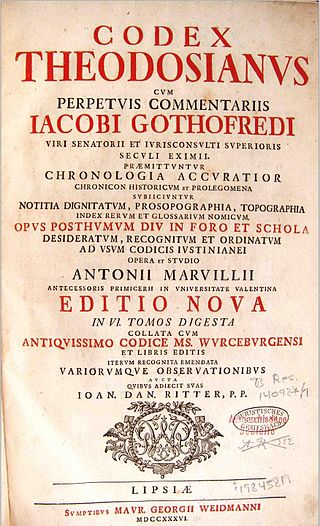
A dictator is a political leader who possesses absolute power. A dictatorship is a state ruled by one dictator or by a small clique. The word originated as the title of a Roman dictator elected by the Roman Senate to rule the republic in times of emergency.

An encyclopedia or encyclopaedia is a reference work or compendium providing summaries of knowledge, either general or special, to a particular field or discipline. Encyclopedias are divided into articles or entries that are arranged alphabetically by article name or by thematic categories, or else are hyperlinked and searchable. Encyclopedia entries are longer and more detailed than those in most dictionaries. Generally speaking, encyclopedia articles focus on factual information concerning the subject named in the article's title; this is unlike dictionary entries, which focus on linguistic information about words, such as their etymology, meaning, pronunciation, use, and grammatical forms.
A brocard is a legal maxim in Latin that is, in a strict sense, derived from traditional legal authorities, even from ancient Rome.

A Dictionary of Modern English Usage (1926), by Henry Watson Fowler (1858–1933), is a style guide to British English usage, pronunciation, and writing. Covering topics such as plurals and literary technique, distinctions among like words, and the use of foreign terms, the dictionary became the standard for other style guides to writing in English. Hence, the 1926 first edition remains in print, along with the 1965 second edition, edited by Ernest Gowers, which was reprinted in 1983 and 1987. The 1996 third edition was re-titled as The New Fowler's Modern English Usage, and revised in 2004, was mostly rewritten by Robert W. Burchfield, as a usage dictionary that incorporated corpus linguistics data; and the 2015 fourth edition, revised and re-titled Fowler's Dictionary of Modern English Usage, was edited by Jeremy Butterfield, as a usage dictionary. Informally, readers refer to the style guide and dictionary as Fowler's Modern English Usage, Fowler, and Fowler's.
In jurisprudence, animus nocendi is the subjective state of mind of the perpetrator of a crime, with reference to the exact knowledge of illegal content of his behaviour, and of its possible consequences.
Onan was a figure detailed in the Book of Genesis chapter 38, as the second son of Judah who married the daughter of Shuah the Canaanite. Onan had an older brother Er and a younger brother, Shelah as well.

The patricians were originally a group of ruling class families in ancient Rome. The distinction was highly significant in the Roman Kingdom and the early Republic, but its relevance waned after the Conflict of the Orders. By the time of the late Republic and Empire, membership in the patriciate was of only nominal significance. The social structure of ancient Rome revolved around the distinction between the patricians and the plebeians. The status of patricians gave them more political power than the plebeians, but the relationship between the groups eventually caused the Conflict of the Orders. This time period resulted in changing of the social structure of ancient Rome.

Ibid. is an abbreviation for the Latin word ibīdem, meaning "in the same place", commonly used in an endnote, footnote, bibliography citation, or scholarly reference to refer to the source cited in the preceding note or list item. This is similar to Idem, literally meaning "the same", abbreviated id., which is commonly used in legal citation.
Security for costs is a common law legal concept of application only in costs jurisdictions, and is an order sought from a court in litigation.
The section sign (§) is a typographical character for referencing individually numbered sections of a document; it is frequently used when citing sections of a legal code. It is also known as the section symbol, section mark, double-s, or silcrow. In other languages it may be called the "paragraph symbol".
The term status quo ante bellum is a Latin phrase meaning "the situation as it existed before the war". The term was originally used in treaties to refer to the withdrawal of enemy troops and the restoration of prewar leadership. When used as such, it means that no side gains or loses any territorial, economic, or political rights. This contrasts with uti possidetis, where each side retains whatever territory and other property it holds at the end of the war. The term white peace has the same meaning.

The Codex Theodosianus was a compilation of the laws of the Roman Empire under the Christian emperors since 312. A commission was established by Emperor Theodosius II and his co-emperor Valentinian III on 26 March 429 and the compilation was published by a constitution of 15 February 438. It went into force in the eastern and western parts of the empire on 1 January 439. The original text of the codex is also found in the Breviary of Alaric, promulgated on 2 February 506.
The Latin adverb sic inserted after a quoted word or passage indicates that the quoted matter has been transcribed or translated exactly as found in the source text, complete with any erroneous, archaic, or otherwise nonstandard spelling, punctuation, or grammar. It also applies to any surprising assertion, faulty reasoning, or other matter that might be interpreted as an error of transcription.
Argumentum a fortiori is a form of argumentation that draws upon existing confidence in a proposition to argue in favor of a second proposition that is held to be implicit in, and even more certain than, the first.
The lex pacificatoria is a Latin neologism, which translates as 'pacific law' or the 'law of the peacemakers'; it refers to the law relating to agreements or treaties ending a state of war or establishing a permanent peace between belligerents, as articulated by state and non-state peacemakers, such as peace negotiators. As such, it is a set of normativizing practices, the ‘industry standards’ of peacemakers. In its relationship with traditional legal doctrines such as the jus ad bellum, it is both incorporated in, and shapes, interpretations of binding legal instruments, and it can also be determinative of, or influence, court judgments. The term was popularized by the legal scholar Christine Bell in her 2008 book On the Law of Peace: Peace Agreements and the Lex Pacificatoria. Bell contrasts the notion with the Law of War, stressing that the art of post-war peace deserves as much consideration as the waging of war, and the notion is related to the jus post bellum, the concept of justice after war, with which it has been critiqued.
Animus is a Law Latin term used in a variety of contexts to designate the motivations of a legal person.
Ius civile vigilantibus scriptum est is a Latin legal phrase that translates to "civil law is written for the vigilant". It can be traced back to the Roman jurist Quintus Cervidius Scaevola and is to this day referred to in different legal systems and contexts. Many variations of the brocard are known all connoting similar but slightly different concepts.





